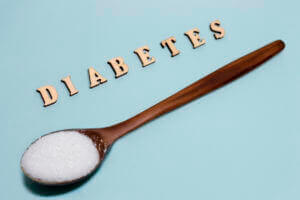
Diabetes is a chronic disease that affects how the body uses glucose, which is a key sugar that is used as a source of fuel for the body’s cells. There are different types of diabetes, but type 1 and type 2 are the main types – and although they have certain things in common, they have many disparities and are managed very differently.
Symptoms of Diabetes
Type 1 and type 2 diabetes share common symptoms, but often type 1 diabetes symptoms can occur suddenly, especially in children. Symptoms of type 2 diabetes can appear more slowly and are often less marked. They can therefore go unnoticed, and as a result, the disease may not be diagnosed for several years after onset and when complications have already arisen.
Symptoms of diabetes can include:
- Frequent urination, especially at night
- Often feeling very thirsty
- Unexplained weight loss
- Vision changes (blurred vision)
- Fatigue, or feeling more tired than usual
- Frequent infections (such as in the gums and skin)
- Cuts and wounds are not healing or take longer to heal
- Increased hunger
What Is Type 1 Diabetes?
The cause of type 1 diabetes (which is also called juvenile diabetes) and the means to prevent it are still unknown. Type 1 diabetes causes the glucose (sugar) level in the blood to become too high. Normally, the pancreas produces a hormone called insulin, which helps glucose enter the cells where it is used for energy; but people with type 1 diabetes produce little to no insulin.
Type 1 diabetics, therefore, require insulin therapy to survive, and this is managed by administering insulin daily to control blood sugar levels. There are different types of insulin available, such as rapid-acting insulin, long-acting insulin, and intermediate options that may be taken at different times of the day. Type 1 diabetics have to test their blood glucose levels regularly.
This condition is believed to be caused by an autoimmune condition that makes the body’s immune system attack and destroys the cells that produce insulin. As a result, glucose does not get into the body’s cells and instead remains in the bloodstream. However, too much glucose in the blood (high blood sugar) can cause a number of different medical complications and make diabetics very sick.
Type 1 diabetes is not linked with lifestyle or being overweight, meaning a person cannot affect their risk of developing the disease one way or the other by lifestyle changes. Type 1 diabetics should, however, try to maintain a healthy lifestyle in order to reduce their risk of complications.
How Is Type 2 Diabetes Different?
Type 2 diabetes, also referred to as non-insulin-dependent or adult-onset diabetes, is the most common type of diabetes. People with type 2 diabetes do produce insulin, but they either do not produce enough or their cells do not respond to insulin – so glucose remains in the bloodstream.
Although anyone can get type 2 diabetes, it most frequently develops in people who are overweight and/or inactive, or who have a family history of type 2 diabetes. People who have prediabetes are susceptible to their condition turning into full type 2 diabetes, so it is still controllable at the prediabetes stage via diet and lifestyle factors.
Type 2 diabetes is managed differently than type 1 diabetes. Unlike type 1 diabetics who have to constantly monitor their blood glucose levels and appropriately administer insulin every day of their lives, type 2 diabetics may not have to fully rely on insulin to control their condition. Treatment primarily involves lifestyle changes including diet, exercise, monitoring of blood sugar levels, and taking medications. However, many diabetics do eventually begin taking insulin.
Diagnosing Diabetes
A urine test may be done to test for the presence of ketones in the urine. Ketones are a byproduct of the breakdown of muscle and fat that happens when there isn’t enough insulin, so it can be a sign of diabetes.
In order to diagnose diabetes, a blood test is performed to check blood sugar levels. There are several types of blood tests that can be used, including a random blood sugar test, a fasting blood sugar test, and an oral glucose tolerance test.
Because there is no cure for diabetes, people with diabetes should manage their disease carefully in order to stay as healthy as possible and reduce the risk of medical complications.
Primary Care for Managing Diabetes
The medical professionals of Hudson MD Group treat chronic conditions like diabetes and acute injuries alike. Our expert primary and specialty medical care providers are able to diagnose and treat a wide variety of medical conditions affecting people of all ages.
If you would like to find out about joining our medical group, find the location nearest you or call (973) 705-4914. You can also fill out our online contact form now. We look forward to hearing from you.


